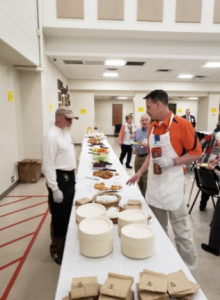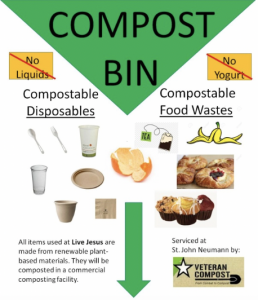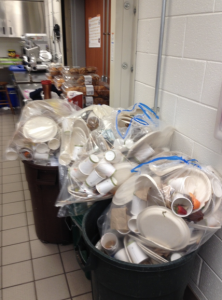HOW TO HOST AN (ALMOST!) WASTE FREE EVENT
Composting Project at St. John Neumann, Reston
By Ed Sabo and Janet Broderick, members of the Care for Our Common Home Ministry
There is no “AWAY” – everything ends up somewhere, often in undesirable places. Pope Francis has referred to what he calls the “throwaway culture”, of which our overuse of single-use products plays a role. He elicits an unflattering image when he describes the earth, “our home, is beginning to look more and more like an immense pile of filth.” [1] He challenges us to change this culture. Empowered by that challenge, the St. John Neumann Care for Our Common Home Ministry wanted to demonstrate to our parishioners that events at the parish could be “waste free.”
An opportunity presents itself:
Rather than starting small and incrementally, we looked for an occasion to make a big impression and impact. An opportunity presented itself in the spring of 2019 when our parish hosted the Annual LiveJesus gathering attended by over 700 participants from the mid-Atlantic region. The event included two social times with food. We jumped in with both feet picturing a row of lonely, empty trash bins at the end of the event.
Questions to Consider:
The undertaking presented a major challenge – we did not have enough washable dishes to handle such a large crowd. Using compostable / recyclable items presented its own challenges.
- How much more expensive are eco-friendly products compared to typical disposable products?
- Would we need to separate compostable versus recyclable items?
- Recycling bins at large events often get contaminated, then rejected by recyclers and the waste goes to incinerator or landfill.
- Where could we dispose of the compostable products?
The world of commercial composting:
Here’s how we tackled those challenges.
- We found and entered into a contract with a commercial composting facility (Veteran Compost [2]) capable of handling a large volume of waste at a reasonable cost.
- We verified with Veteran Compost what can and cannot be composted.
- We worked with event organizers to select and purchase only compostable items.
- We coordinated with parish custodial staff to display properly signed waste collection bins.
- We learned that compostable products ran roughly 25% higher in cost over disposable products and the cost for compost pick up was $30 ($10/bag for 3 bags.)
Lessons Learned
While we were mostly successful, we did learn several valuable lessons.
- It would have been better to buy baked goods and fruit in bulk with eco-friendly packaging.
- Liquid wastes (coffee, juice, yogurt) are not compostable due to chemistry of the breakdown process. This required having labelled buckets available to collect liquid wastes before disposing of the cup in the compost collection bins.
- Also, since we were charged by volume rather than weight, we went through the collection bins to stack cups and plates thereby reducing the number of bags.
- The main lesson learned was that we could host a crowd of 700 with almost not waste!
Perhaps the most gratifying aspect of this project was engaging with folks who truly appreciated our efforts at becoming more sustainable. Comments such as “wow…this parish is really green” and “I think we could do this at our parish” were much appreciated.
Since that event, we now have a weekly pick up for compost at our parish covering waste from the kitchen, lunch room, pre-school and rectory. Changing our hearts and minds are the first steps in changing our “throwaway culture.”
Here is our presentation summarizing the event.
PHOTOS
Continental Breakfast Serving Line with Compostable Napkins, Plates and Utensils

Poster for Waste Collection Bins

Bags of Collected Waste for Compost Facility (before consolidation)

We nested plates and cups and consolidated to 3 bags
[1] Laudato Si, On Care for our Common Home, paragraph 21
[2] Veteran Compost servicing parts of the DC metro area: https://www.veterancompost.com/